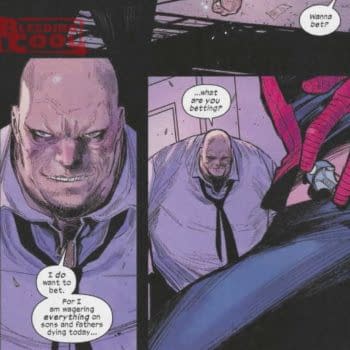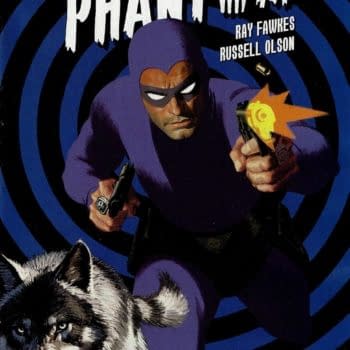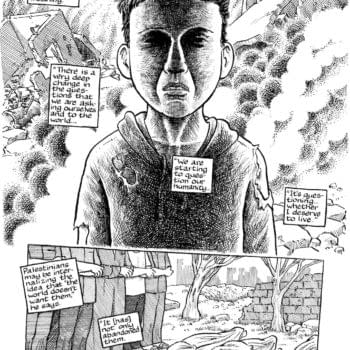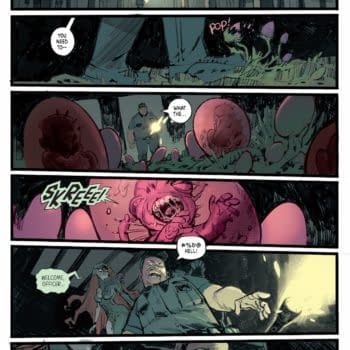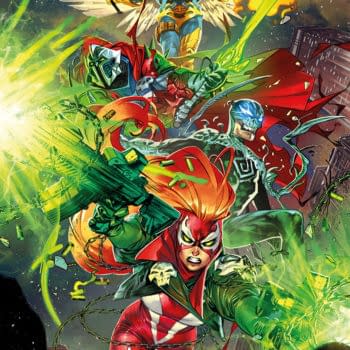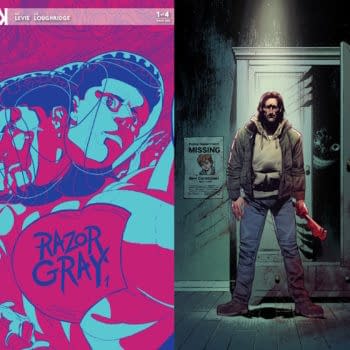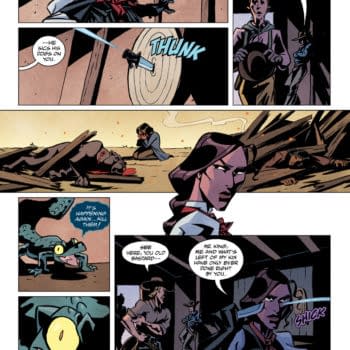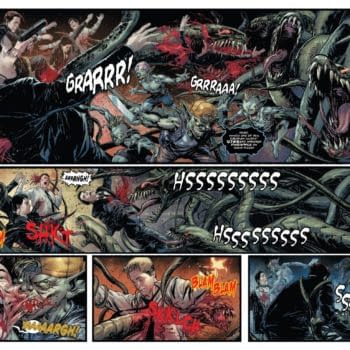Posted in: Comics, Recent Updates | Tagged: archie, budgie, Comics, gay, lee barnett, marriage, marvel
Lee Barnett Is The Adult In The Room – Super Tuesday And Gay Marriage
Lee Barnett writes for Bleeding Cool;
"There is quite enough sorrow and shame and suffering and baseness in real life, and there is no need for meeting it unnecessarily in fiction." – Theodore Roosevelt, 1905.
While there have been comic book stories (and in Kurt Busiek's Astro City, an entire series) that have attempted to conflate super-heroes and what we call "real life", non-super-hero comic books have mostly excelled at showing "the real world".

However, sometimes 'real life' and the comic book industry don't just bump together, they collide on the front pages of the newspaper, or on the televison news. And in the last couple of weeks, they've done so, and in a couple of ways, it looks like they're going to continue doing it. I hope it'll happen in a way that doesn't pander to the lowest common denominator, but going by previous incidences, I'm not so confident.
Rather pleasingly, it's been a while since I've seen a newspaper or website headline containing Smash! or Pow! when reporting on comics, with the notable exception of the evergreen "Pow! Rare comic book sells for umpteen million dollars" type of story.
Fortunately though, comic books and graphics novels, while still not yet seen in many areas as an equivalent medium to books or movies, are now often regarded and reported in arts sections with the respect they deserve, as are the creators.
It's also thankfully been some time since I've seen a politician – of any stripe, from either the UK or US – attack their opponents' policies as being "comic book politics" or some such. However, as political races get closer, and tempers get raised, it's not entirely unknown for lazy clichés to be reached for. Neil Gaiman said it a while back: "A nice, easy place for freedom of speech to be eroded is comics, because comics are a natural target whenever an election comes up."
It was, therefore, with a minor form of dread that I approached the news media last Tuesday. If you're unaware of the importance of the Republican primaries and caucuses that took place on "Super Tuesday", you're probably not living in the United States. I write "probably", because sadly, as in the UK, the number of people uninterested in politics in the US is scary. As scary as some of the people in American politics, but that's a separate point for another day.
So, Super Tuesday; the first report I read actually gave me some hope. At least the excerpt I read, which appeared cleverly to use a comic book metaphor to describe how a battered Republican party was looking upon Super Tuesday to rescue it "like a comic book superhero".
Would that the excerpt had been accurate. No, the actual piece started:
It's Super Tuesday! We hope it swoops down and saves us from this scary Republican field, like a comic book superhero. – nj.com
Dammit.
The insulting implication is that comics book stories are entirely removed from the real world and vice versa.
I'm excluding humour pieces asking "which super-hero would various candidates be?" and those in similar vein, but it still bugs the hell out of me – why do people who don't read comic books still think it's ok, and beneficial, to denigrate the comic book industry and its readers?
The question, of course, is a false one – there's a redundancy involved in it. You can, and should, exclude the words "who don't read comic books", so the question reads:
"Why do people still think it's ok, and beneficial, to denigrate the comic book industry and its readers?"
Because, in a major way, it's irrelevant whether or not the person insulting the books and their audience reads comics or not. It's the motive and intention behind the sentiment that's as contemptible as the actual practice of it.
In my opinion, it comes from two diametrically opposed things: ignorance of the comic book industry by many on the one hand, and a very good knowledge of that ignorance on the other. And those who possess the first are manipulated by those who have the second.
While lack of opportunity to read comics is far less an excuse than it once was with comics shops, online stores, and yes, torrenting, there are far more people in both the US and the UK who don't read comics than do. And while those who don't read comics almost certainly once did, their recollections of those comics are stuck in the tarpit of memory.

And the easiest way to do that is to proclaim that comics aren't what they once were. Which, you know, is fine. Movies aren't what they once were, nor are novels, nor what's popular in the music charts. But again, that's ok. Tastes change and creative product changes to reflect that. And sometimes it's the reverse; the creative product changes, and popular taste evolves right alongside it
But change does not equate to worse. It never does. Never.
What the change results in can be worse (in your opinion), or better (ditto), but change itself is neither. Which brings me, via a Scottish Cardinal, the town of Riverdale, a promotional advert from Marvel and one of the few times I've entirely agreed with the current British Prime Minister, to another recent occasion on which comics and real life smashed into each other.
Last week, Cardinal Keith O'Brien, the head of the Roman Catholic Church in Scotland let forth a broadside on the British Government's potentially legislating to allow gay couples in the United Kingdom to get married.
Let's be clear: gay couples in the UK who've entered into a civil partnership already have the benefits, privileges and, as I understand it, all the same legal rights as heterosexual married couples. They just can't get "married". It's a legal absurdity which has rightly and roundly been condemned as intolerant and demeaning.
Both sides of the argument do themselves no favours by stating that to them the word "marriage" is important, but that the other side shouldn't be all that concerned about the word; it is important to both sides, and that should be recognised, but it's just plain wrong that "marriage" is reserved exclusively for heterosexual unions.
We're all in favour of love, yes? And one of the progressions of love, one of the ways we proclaim to society that "this is the one" is to formalise that relationship… by getting married. Yes, it's not the only way, and many couples I know have chosen not to get married. That's their right, and they've exercised it . The point is that current legislation in the UK, and in most of Europe, and in most of the United States, excludes marriage from being a choice for some, based solely on their sexuality.
It's just wrong. Sometimes, you see something and have to say it's just plain wrong.
Just as wrong in fact, just as addle-headed, as the arguments advanced by the One Million Moms organisation when they wrote to Toys R Us (and exhorted their members to do the same) demanding that a recent issue of Life with Archie be removed from their shelves merely because the comic showed on the cover the marriage celebrations of two characters who happened to share the same gender.
I say "the arguments advanced". That's being kind. As Stu Nathan wrote: "Let's face it, it's so easy to pick holes in the anti-gay marriage argument that it barely deserves to be called an argument. It's a flail."
One of the most stupid flails (though admittedly, that's like debating which of Snow White's dwarfs was shortest) was their assertion that it would be difficult, for parents who didn't want to introduce the concept of differing sexualities to very young children who see the cover , to explain why two men were shown under the banner "Just Married".
I'm sorry they find it too difficult to say "Because they just got married. You see, when two people are in love, they sometimes get married." See? It's not difficult at all, is it? I'm entirely uncertain why it needs to be anything more complicated than that.
As for my concurrence with David Cameron, well, it's rare enough I agree completely with him over anything, but at last year's Tory party conference, he said:
"Conservatives believe in the ties that bind us; that society is stronger when we make vows to each other and support each other. So I don't support gay marriage in spite of being a Conservative. I support gay marriage because I am a Conservative."
Nice one, Dave. Now, if you can cease being a bloody idiot on some other things, I'd appreciate that as well.
And so to Marvel's ad for an August wedding between… ah, well, that's the thing. They're being coy.
I like comic book weddings. Like "real life", they're the opportunity for good stories, with ongoing inherent life-changing consequences for those involved. And just as in real life, it shouldn't matter a damn whether the characters are the same sex or not.
But of course, in both, it seems to. It's understandable, though hardly to be applauded, why Marvel are handling it this way.
For as long as there's some publicity or extra sales to be gained from making it a 'big thing", major comic book companies will continue to effectively limit the number of gay characters in a major series, and treat characters who are gay as something unusual.
But again, it's just plain wrong. Yes, it's better than it once was; some progress has been made. But it's still unacceptable that any discrimination, intended or otherwise, conscious or unconscious, exists in comic books.
Readers, creators and editorial staff can change that. And they should. The former by letting the company know their preferences, and the latter by actively encouraging characters of all sexualities; the only criteria should be: do they serve the story?
Real life prejudice may be harder to fix, but I have a horrible feeling both will take just as long.
Lee Barnett is a writer. He's written comic books, radio comedy and two collections of short stories under the title THE FAST FICTION CHALLENGE. He's also a contributor to elephantwords . Known in the UK Comics industry for the annual hypotheticals panel he devised and presented with Dave Gibbons at the UK Comics Festival, some people call him "budgie".







